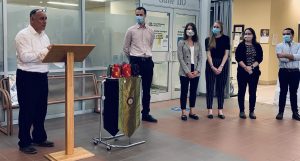Nova Scotia Health recruiters see spike in calls from U.S. doctors

More doctors and other health professionals from the U.S. want to move to Nova Scotia, according to Nova Scotia Health. (Province of Nova Scotia)
The unstable political situation in the United States may be good news for the Nova Scotia health care system.
More doctors and other health professionals working in the U.S. are looking to move north. One of the places they’re calling is Nova Scotia. And some of them also want to move to Queens County.
Lauren Murphy, director of recruitment and volunteer services with Nova Scotia Health, says they’ve seen an increase in applications from people from the U.S.
“Honestly, we’re hearing some pretty amazing stories,” she told QCCR this week.
“We’re hearing people who maybe have family members who are trans who don’t feel safe anymore. We’re hearing about people who are Canadians but have been living in the U.S. for years and working in their health care system and not feeling safe anymore and wanting to come back to Canada. We’re hearing from people who are internationally educated but living in the U.S. and again not feeling safe. It’s a scary time in the States and I do think people are seeing Canada as that safe space.”
Murphy said that the health care professionals reaching out to Nova Scotia Health recruiters are extremely qualified and experienced. They include doctors, nurses and other professionals.
“And the beauty is that the hospital setting in the U.S. is very very similar to what we have in Canada in terms of the level of care. And so being able to hire someone from the U.S., they can pretty much hit the ground running. As horrible as it is, maybe there is some silver lining that people can find a new home here in Nova Scotia and build roots and bring family or create families, and that’s great for our economy and great for us as a province.”
Murphy did not say how many doctors or other health professionals are interested in making the move from the U.S. to Nova Scotia.
According to data obtained in January 2024 by the Nova Scotia Government and General Employees Union, more than 1,000 health-care positions were still waiting to be filled in Nova Scotia. That includes professionals other than doctors and nurses.
And in March, about 96,000 Nova Scotians were still without a primary care provider. That was down from February’s number of just over 104,000. About nine per cent of the population is still looking for a family doctor or nurse practitioner.
Murphy acknowledged that there’s a global shortage of health-care professionals. Jurisdictions like Nova Scotia have been looking in other countries to fill those spots.
The process can take some time, especially as candidates navigate immigration and licensing requirements. Nova Scotia Health has its own immigration team to help make it easier for clinicians or other professionals to move here.
Nova Scotia recently opened a new centre to help speed up the licensing process for internationally trained physicians. It takes about 12 weeks to complete and doctors agree to practise in the province for at least three years.
Murphy says American-based doctors also ask her recruitment team about the differences in culture and taxation.
“It’s a huge step to move to a different country,” she said. “A lot of the conversations start off very exploratory. If you’re thinking about the U.S., you’re also potentially talking to a candidate who is coming from a state that doesn’t pay tax.
“But … we really are seeing people who are like, ‘No, we have to do this, we’re taking the plunge.’ And we’re really seeing those numbers now.”
Some of those doctors and other professionals are interested in moving to Queens County.
Dr. Al Doucet is the chair of the Queens General Hospital Foundation, which works with Nova Scotia Health to bring doctors to the area.
He was out of the country and unavailable for an interview Friday. But he said in a text message that the foundation is getting inquiries from physicians and physician assistants about moving here.
Nova Scotia Health recently named Liverpool-based Dr. Alison Freeman the MD recruitment and retention lead for the South Shore.
To help with those recruitment efforts, Nova Scotia Health is holding a provincial career fair on March 27 at 11 locations around the province. Officials will be at the Michelin Social Club in Bridgewater from 10 a.m. to 7 p.m.
Murphy says the job fair targets Nova Scotians who are interested in a first-time position with Nova Scotia Health or transferring to a different part of the province. More than 220 people were hired through last year’s job fair.
Email: rickconradqccr@gmail.com
Listen to the audio version of this story below


